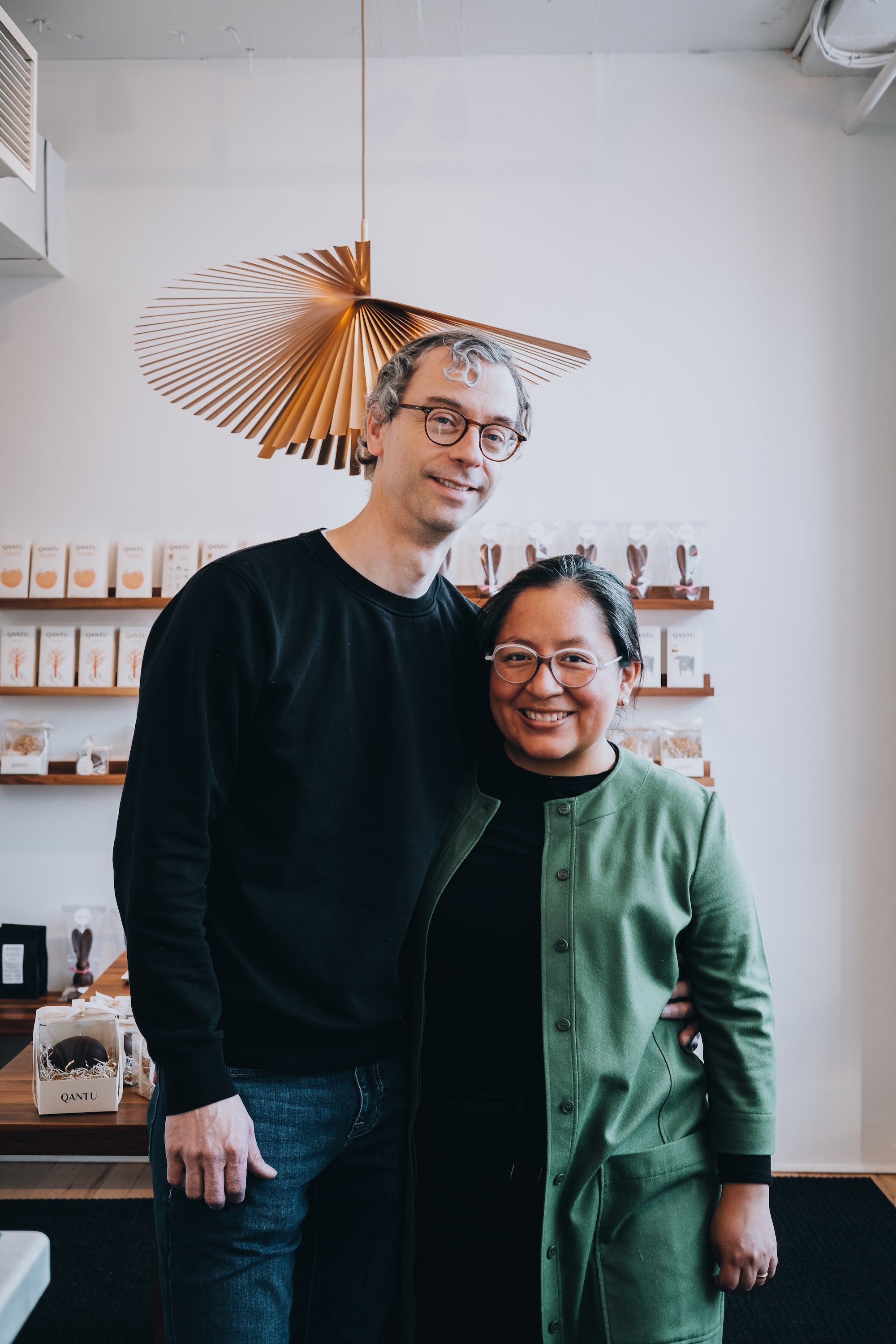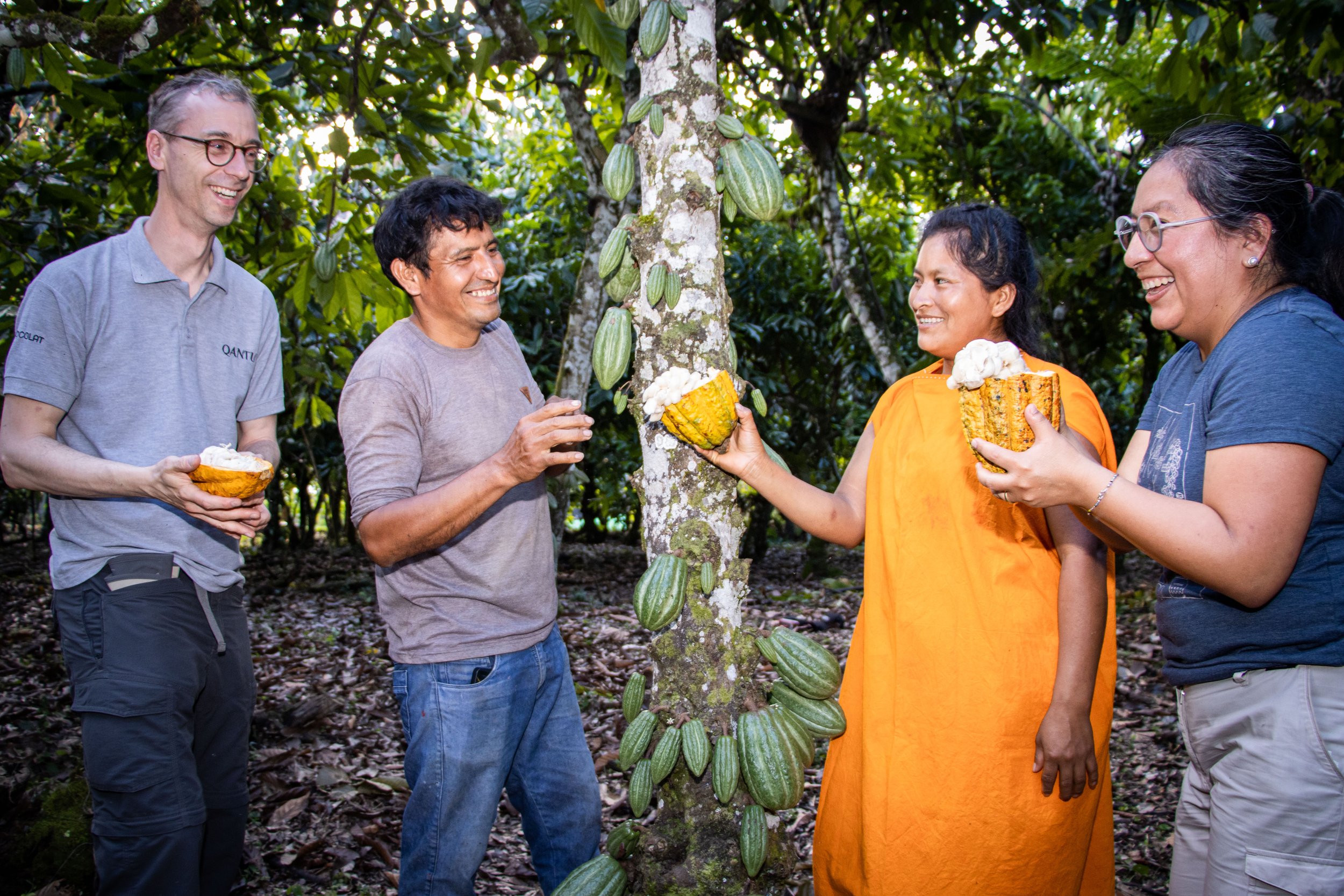Qantu: A Canadian Chocolate Company with Roots of Love in Peru
Maxime Simard and Elfi Maldonado in Montreal shop
Over the last decade, Canada has developed a thriving craft chocolate industry. Companies such as Soma in Toronto and Sirene Chocolate in British Columbia have helped put the country on the chocolate map. In Montreal, Qantu which is crafted exclusively from Peruvian cacao is a love story, or perhaps several. It’s the story of the founders, their love for Peru, Peruvian chocolate and most importantly the Peruvian people and the biodiversity of Peru.
Background
Maxime Simard and Elfi Maldonado check cacao pods
The story of Qantu starts in 2007 with a meet-cute on a Peruvian dance floor. Peru-native Elfi Maldonado found a dance partner in Maxime Simard, then a Canadian exchange student in Lima, and the rest became romantic history. “It was love at first sight,” Maldonado says.
The young couple moved to Montreal, where Maldonado worked as an IT professional, and Simard pursued an engineering degree. They were brainstorming ideas for a business to start together when a series of serendipitous encounters led them to cacao farms.
An International Love Story
Between 2014 and 2016, the couple traveled back to Peru and in the village of Alto el Sol, they met cacao farmers who viewed themselves as stewards of ancient varieties. At the Salon du Chocolat in Lima, they discovered the rare white cacao beans of the Norandino cooperative and the Chuncho beans from Ayacucho, in the south-central Andes of the country. The passion of the producers for their crop was infectious, inspiring the life partners to get involved with chocolate.
In 2016, the couple ran their first chocolate batches back in Montreal with varying success. After a few months of perfecting recipes, Qantu officially launched the following year. Named after the national flower of Peru and Bolivia, the word carries a lot of meaning for the founders. “It’s a symbol of unity and hospitality in the Amazon region,” explains Simard.
Maxime Simard and Elfi Maldonado with the farmers
Qantu’s mission is simple: preserve the biodiversity of native Peruvian cacao. To that end, the couple sources cacao beans from Maldonado’s homeland after meticulous research of the farms they work with. “What sets us apart is our unique connection and link with farmers in Peru,” explains Simard. “We don’t buy through a broker or importer. We visit the farms, we check the way farmers live, and how they take care of their trees. We sometimes advise on fermentation and in the end, we verify every bag.”
Maldonado speaks highly of the cooperatives they partner with, such as Pangoa. “It’s an organization with 300 cacao-producing members,” she says. “The cooperative has a strategic plan designed to set up farmers for success all the way until 2050. There’s a leadership school for members. Recently, they also launched a natural composting facility to decrease farmers’ reliance on commercial fertilizer.”
These tight relationships translate into outstanding chocolate, which started collecting awards by Qantu’s first business anniversary.
The Product Range Story
Single origin bars photo credit Emile Desroches Larouche
The range of 70% single-origin bars showcases the diversity of Peruvian cacao terroir. Where Chaska evokes summer with its bright red fruit aromas, Chuncho’s reminiscent of fall thanks to its roasted hazelnut notes. With hints of citrus and honey, Gran Blanco’s a light brown bar that pairs well with orange cocktails.
The couple’s creative nature comes through in thoughtful inclusion bars, such as their Silk Road, which marries 70% dark chocolate with a light sprinkling of spices including fennel, saffron, pepper, and rose petals, allowing the creation to pair with a cup of black tea or a glass of red wine. As for the 60% Chuncho with maple and fleur de sel, it’s Quebec in a bar.
As the co-founders grow their line of bars, they remain anchored by their mission of preserving cacao biodiversity. “That’s why we want to source more exceptional cacao micro lots for our “Première Fois” collection,” says Simard.
Launched in the winter of 2022, “Première Fois” (“First Time” in English) spotlights single estate cacao in bars so unique, they feel like tasting chocolate for the first time. For their first release, the couple transformed a small lot of beans from Démetrio Huacre, a Cusco-based producer, into a 100% bar with delicate floral notes.
Maxime Simard and Elfi Maldonado and farmers tossing cacao beans
Chocolate, Connections and Change Story
With global distribution and multiple awards to its name, Qantu has, by all accounts, made it. Still, for Maldonado and Simard, the best part of this entrepreneurial journey remains the human connections. They’re proud of engaging in direct trade and of the impact they have on their partners.
“We don’t change a producer’s life by buying 10 tons of beans,” says Maldonado, “but we’ll support their development by sharing ideas. After trying our Palo Santo bar, members of the Pangoa cooperative launched chocolate bars infused with mohena (Peruvian walnut) and eucalyptus. For us, this feels very rewarding.”





